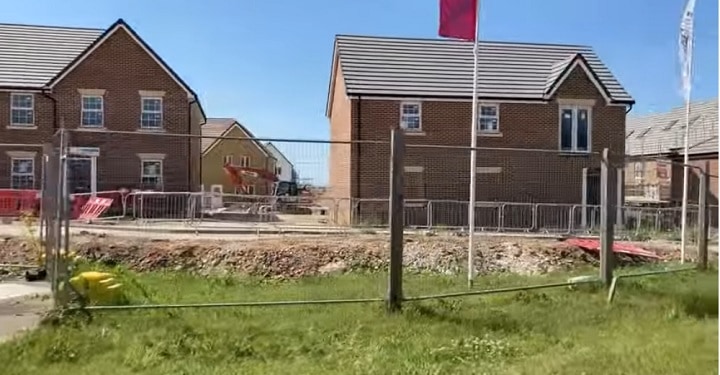
Mandatory house building targets for councils look set to be overturned as Secretary of State for Levelling Up, Michael Gove, includes new measures to a bill due before Parliament tomorrow (December 6).
Following rebellion by some 60 MPs backing a plan to ban mandatory targets in England, Mr Gove has announced measures which will give local councils greater control over housebuilding in their areas. These will include looking at local housing needs rather than rigid adherence to nationally set targets, making it easier to develop brownfield rather than green spaces and introducing a registration scheme for short-term lets.
Further measures will be set out by the government tomorrow (Tuesday 6 December). The changes will be made alongside the Levelling Up and Regeneration Bill as it progresses through Parliament.
Government says housing targets remain an important part of the planning system but it will consult on how these can better take account of local density.
‘Planning system is not working’
Secretary of State for Levelling Up, Housing and Communities Michael Gove said: “We have an urgent need in this country to build more homes so that everyone – whether they aspire to home ownership or not – can have a high-quality, affordable place to live. But our planning system is not working as it should.
“If we are to deliver the new homes this country needs, new development must have the support of local communities. That requires people to know it will be beautiful, accompanied by the right infrastructure, approved democratically, that it will enhance the environment and create proper neighbourhoods.”
Mr Gove has also asked the Competition and Markets Authority to consider undertaking a market study on housebuilding.
Green Belt
New guidance will set out that local authorities are not required to review Green Belt to deliver homes. Brownfield land will be prioritised for development, with the government launching a review into how such sites are used.
Alongside measures in the Bill to tackle slow build out by developers, the government will also consider new financial penalties for companies failing to deliver housing despite having planning approval and give councils powers to refuse further permission across their area.
The Bill already includes power for councils to apply a council tax premium of up to 100% on empty and second homes.
The government will establish a registration scheme for short-term lets and also consult on whether planning permission should be required for new short term lets, especially in tourist hotspots.
‘Meeting local housing need’
Tom Fyans, interim chief executive of CPRE, the countryside charity, said: ”It seems the government has finally got the message that solving the housing crisis hinges on meeting local housing need, rather than arbitrary top-down targets.
“If confirmed, this very sensible rethink is encouraging news for those at the sharp end of the housing crisis, as well as the countryside.
“The priority now must be to focus on quality social housing in the right place. Demand for social housing is growing nearly six times faster than the rate of supply in rural areas and, at current rates, the backlog of low-income families needing accommodation would take 121 years to clear.
“Councils must retain a strong voice in the planning process and need more resources if they are to deliver genuinely affordable housing. We are encouraged by proposals to address the problem of short-term lets. A registration scheme may be a good first step, but we need to see much stronger controls and use of the planning system to determine local priorities. Only then will we see a better balance of housing options to help families and young people who simply can’t find a place to live in some rural areas.
“A new government review on making it much easier to build on brownfield land is also really welcome. Currently we’re not making enough use of our previously developed land and charging higher levies on greenfield sites, as well as a genuine ‘brownfield first’ approach in planning policy, are some of the ways we can unlock its potential.”
Thanet Local Plan
The measures could help to ease the difficulties in Thanet which has seen a growth in holiday let properties while long-term tenancies reduce in supply. It could also mean some development plans are no longer needed and brownfield sites will now be pushed rather than greenfield.
Earlier this year Thanet council leader Ash Ashbee asked government to allow the district to halt a review which proposes an additional 4,000-4,500 homes be created on the isle by 2040. The properties would be on top of the 17,140 already required by 2031.
She also proposed to raise argument to get the housing need target for Thanet reduced.
The Thanet local plan– a blueprint for housing, business and infrastructure on the isle – has housing need calculated using the Government’s “standard method” resulting in a figure of 21,700 dwellings by 2040. The local plan up to 2031 – with 17,140 homes required – was adopted in July 2020 but at the end of last year a review began to extend the plan to 2040.
Thanet council is currently considering around 200 sites on the isle that have been put forward as potential areas for development or open spaces following a ‘Call for Sites’ last year,
It is not yet known how, or if, the government announcement will affect that process.
North Thanet MP Sir Roger Gale said: “The measures proposed by the Secretary of State, Michael Gove, in response to the amendments to the Levelling Up Bill that many of us have supported , are most welcome.
“We shall need to study the detail but I hope that this means that Thanet and Canterbury councils will now be able to protect the agricultural land that we need for sustainability while also getting built the affordable housing that local people need.”

